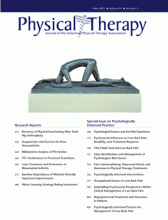Abstract
There is mounting evidence that occupational factors influence the extent of sickness absence following an episode of low back pain, but there have been limited efforts to integrate the identification and management of occupational factors into the routine practice of physical therapists. Systematic reviews suggest that a client's report of heavy physical demands, inability to modify job tasks, work stress, lack of organizational support, job dissatisfaction, poor expectations for resuming usual work, and fear of reinjury are indications of significant barriers to returning to work. Recommended strategies for evaluating and addressing occupational factors are explored with respect to the physical therapist's role in client assessment, development of activity and lifestyle recommendations, therapeutic exercise, communication with other providers, and summary reports. Primary recommendations include: (1) administration of self-report questionnaires to assess a client's perspective of physical job demands, (2) client-centered interviewing to highlight individual return-to-work concerns, (3) early discussions with clients about possible job modifications, and (4) incorporation of clients' workplace concerns in progress reports and summaries. These strategies may improve low back pain outcomes by encouraging effective communication with key stakeholders and by developing clients' ability to resolve obstacles to returning to work.
Footnotes
Dr Shaw and Professor Main provided concept/idea/project design. All authors provided writing. Ms Johnston provided data collection and analysis. Professor Main provided project management. Professor Main and Ms Johnston provided consultation (including review of manuscript before submission).
- Received August 12, 2010.
- Accepted November 24, 2010.












